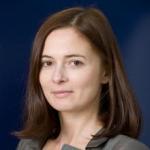Today, Isabelle Ryl, Director of Paris – Rocquencourt Research Center, tells us more about Inria and its involvement in the smart factory revolution.

Established in 1967, Inria is the only French public research body fully dedicated to computational sciences. Combining computer sciences with mathematics, Inria’s 3,500 researchers strive to invent the digital technologies of the future. Researchers at Inria published over 4,450 articles in 2012. They are behind over 250 active patents and 112 start-ups. The 180 project-teams are distributed in eight research centers located throughout France. Inria contributes to innovation within France by transferring its technologies and skills to industry. It has a range of means for promoting technology transfer, including a program specifically aimed at SMEs, strategic partnerships with R&D departments of major industrial groups, and support for start-ups.
In 2011, Inria started a program in California called Inria@SiliconValley. What are your specific objectives and activities here?
The aim of the program is to strengthen and structure existing collaborations between Inria research teams and Californian universities in order to improve their visibility and impact. It is led in cooperation with CITRIS (Center for Information Technology Research in the Interest of Society). The goal is to create and support new innovative projects with complementary competences, addressing scientific challenges of the digital society, mainly in the areas of new computation and data analysis tools, computing and communication for the future Internet, content and supporting learning technologies, and smart cities.
Inria is a sponsor of CaFFEET’14, what technologies developed at Inria have the potential to fuel the smart factory revolution?
The answer is easy: The society today is digital! This is not just a buzzword. The models and simulations we develop are keys to the manufacture of new production lines, be it at the level of optimization, energy consumption, or design. Monitoring the production lines and their tolerance to faults are examples of topics that involve core Inria technology.
What do you expect from CaFFEET’14, and on the other hand what is Inria bringing to this event?
This type of event is a vivid example of the convergence between industry questions and research answers, from which can emerge tomorrow’s innovations. The specificity of CaFFEET is that each one of its events addresses a focused industrial problem, involving very diverse domains, and thus affords a unique and glocal view of the corresponding “hot topic”. This is why Inria considers it an important partnership.
To attend CaFFEET’14
- For more information http://caffeet.org
- To register for this event https://www.eventbrite.com/e/caffeet-2014-tickets-12434374549
- To apply for CaFFEET TechShowCase http://bit.ly/1szUIwj